Education
Top Enlightening Educators & Learning Pages To Follow Online
If you’re looking to get stuck into some great enriching content from the fields of early childhood education, coding, schools for low-income families, heritage, history and sex education for teenagers over the holidays, here are 9 stellar people and organisations you can binge from start………..
Published
3 years agoon

If you're looking to get stuck into some great enriching content from the fields of early childhood education, coding, schools for low-income families, heritage, history and sex education for teenagers over the holidays, here are 9 stellar people and organisations you can binge from start to finish on social media. Read about Dr Jill Biden, Dr Swati Popat Vats, Shaheen Mistri, Vikramjit Singh Rooprai, Vicki Davis, Alice Keeler, ThatMate, MAD Stuff by Rob and Little Free Library now!

Who: Dr Jill Biden
Bio says: Lifelong educator. Military mother. Grandmother. Sister. Wife to Joe Biden.
ScooNews loves: A teacher by profession, she taught English and reading in high schools for 13 years and taught adolescents with emotional disabilities at a psychiatric hospital. She is also the founder of the Biden Breast Health Initiative non-profit organization, co-founder of the Book Buddies program and is co-founder of Joining Forces with Michelle Obama.
Famous quote: My students have shown me so many times that it's not always about being the perfect person in the perfect position – it's about showing up when you're needed.
Read: Her book ‘Where the Light Enters: Building a Family, Discovering Myself’
Don’t miss: Her powerful tweets like this one – Together, we will build a world where the accomplishments of our daughters will be celebrated, rather than diminished.
Top accounts followed: Tara Westover, Michelle Obama, Kamala Harris
Follow at: @drbiden (IG & Twitter), @DrJillBiden (FB)

Who: Dr Swati Popat Vats
Bio says: President Podar Education Network. President Early Childhood Association. Author, parenting expert, parent mentor, blogger and child rights activist
ScooNews loves: In a world where pre-schooling and early years education is not taken as seriously as higher education, Dr Vats is passionately promoting early childhood education and care. She has authored several books for children as well on topics less talked about.
Famous quote: ‘Kiducation’ was a term I coined in 2000 for Podar Jumbo Kids
Read: Her books ‘How to Teach So Kids Can Learn’, ‘When Touch Becomes Trouble’, ‘Quality in Early Childhood Education’ and ‘Once Upon a Story: Divaswapna and the Gijubhai Method’
Don’t miss: The Webinar ‘The Teacher & the Taught – Education, Music & Arts in New India’
Top accounts followed: Agarkar Centre of Excellence, Thought igniter, APER, Make in India, NITI Aayog
Follow at: @swatipopat (IG & Twitter)

Who: Shaheen Mistri
Bio says: Building a movement of leaders towards educational equity. Founder, Akanksha Foundation and CEO, @TeachForIndia
ScooNews loves: Shaheen is an Ashoka Fellow (2001), a Global Leader for Tomorrow at the World Economic Forum (2002), and an Asia Society 21 Leader (2006). She has earned global recognition for her dedication and commitment to the fight for equality in education. She founded the first Akanksha Center in 1989, enrolling 15 children and employing college friends as volunteers. Over the past 30+ years, the foundation has expanded to almost 4,500 children in 51 centres and 16 schools.
Famous quote: Every child is capable of achieving great things if the opportunities are given
Read: Her co-authored book ‘Redrawing India: The Teach for India Story’
Don’t miss: Her tweets with hashtag #DontStopLearning
Top accounts followed: Sunitha Krishnan, Tara Sharma Saluja, WISE, Magic Bus India, Pooja Taparia
Follow at: @shaheen_mistri (IG), @shaheenmistri (Twitter), @TeachForIndia (Facebook)

Who: Vikramjit Singh Rooprai
Bio says: Author, Educator & Heritage Activist. Redefining the way we teach.
ScooNews loves: His poetic way of expressing the love he has for forgotten history. The way Vikramjit loves to explore the smallest of small things about a historical place and embed it in his story is magical. And of course, his attempt to spread knowledge about heritage is extraordinary.
Read: His book ‘Delhi Heritage: Top 10 Baolis’
Don’t miss: The super interesting session where Vikramjit shares how playing cards came into existence
Top accounts followed: Project Dastaan, The Ancient Economies Podcast, History Encyclopedia, Google for Education, India Culture Lab
Follow at: @delhiheritage (IG), @DelhiHeritage (Twitter), @vikramjitsinghrooprai (FB)

Who: Vicki Davis aka The Cool Cat Teacher
Bio says: I ‘love’ students! Best Teacher Blog Winner, Mom, Speaker, Author, Helper, HOST 10 Minute Teacher, Linked In Top 10 Ed Voice 2020
ScooNews loves: Vicki is known for creating more than twenty global collaborative projects including the Flat Classroom Project which won ISTE's Online Learning Award in 2006 and the MAD About Mattering Project in 2016 and 2017.
Famous quote: Teachers are amazing people living in tough times, doing the right things even when the wrong things are being done to them.
Read: Her books ‘Reinventing Writing: The 9 Tools That Are Changing Writing, Teaching, and Learning Forever’ and ‘Flattening Classrooms, Engaging Minds: Move to Global Collaboration One Step at a Time’
Don’t miss: The 10 Minute Teacher Podcast ‘How to Engage Students in Zoom and Teach Effectively at a Distance’
Top accounts followed: GoGuardian, Minecraft: Education Edition, DeepMind, Apple Podcast, Hamis Brewer
Follow at: @coolcatteacher (IG, FB & Twitter)

Who: Alice Keeler
Bio says: Mom of 5, Math Teacher, Youcubed consultant, Author, Speaker, Google Certified Innovator, T3 Trainer, NMCk12 Ambassador, MIE, gamification, #coffeeEDU, coder
ScooNews loves: She’s a Google Certified Teacher, New Media Consortium K12 Ambassador, Microsoft Innovative Educator and LEC Admin & Online and Blended certified. She’s developed and taught online K12 courses as well as the Innovative Educator Advanced Studies Certificate. She strongly believes that kids are not failures and using technology to change the way we approach learning and grading is the new normal. She aspires to incorporate technology more and more in teaching and likes to spend her time developing efficient, engaging, and effective digital learning environments that go beyond worksheets and PDFs.
Famous quote: The only difference between 'I'm a techie' and 'I'm not a techie' is the willingness to click on stuff and see what happens.
Read: Her books ‘Stepping Up to Google Classroom: 50 Steps for Beginners to Get Started’, ‘Teaching Ma2+(h) with Google Apps: 50 G Suite Activities’ and ‘Ditch That Homework: Practical Strategies to Help Make Homework Obsolete’
Don’t miss: Learning programmes (like coding, SEL opportunities, Quizzes in Powerpoint, etc.) on Teacher Tech with Alice Keeler
Top accounts followed: Lee Araoz, Dan Finkel, GoNoodle, Amit Agarwal, Erica Buddington
Follow at: @alicekeeler (IG & Twitter)

Who: ThatMate
Bio says: We create awareness about sexual health and mental health.
ScooNews loves: ThatMate enables teenagers to cope with stress management, peer pressure, anger management, bullying, self-esteem, etc. Their curriculum-based programmes are safe, reliable and culturally appropriate.
Punch line: Trump the taboo
Read: Teen Diary Entry on their blog/website (https://thatmate.com/category/thatmate-blog/)
Don’t miss: Their friendly, colourful illustrations that are used to teach age-appropriate sexual and mental health curriculum to children
Top accounts followed: Dr Jo Robinson, Dr Bhooshan Shukla, Goonj, Dr Michael Carr-Gregg, Dr Shefali
Follow at: @thatmateteam (IG & Twitter), @ThatMate (FB)

Who: Mad Stuff With Rob
Bio says: You would remember me from POGO on M.A.D. but I have now started my own YouTube channel. So for all those who want to catch up on the new stuff that I've been doing then I suggest you subscribe! We upload a new DIY video every Wednesday and Friday at 5:00 pm!
ScooNews loves: The show’s host Harun Robert a.k.a Rob, who hosted a famous kids’ learning show M.A.D on POGO years ago. On his YouTube channel, this craft-wizard now teaches fun DIY techniques as a part of the play-learn module for kids from the comfort of his Goa home.
Famous quote: We keep generating fresh trash these days. For example, in my old show, I used to make models out of floppy disks, which were replaced by CDs. Now, it is hard disks. Once trash changes, you come up with a different idea and work around that.
Watch: Videos on Pringles drum circles, DIY custom stamps, printing t-shirts at home and how to etch on metal using saltwater
Don’t miss: His vlogs ‘Rob in the hood’
Top accounts followed: The Happy Newspaper, Mounica Tata, Domestika, Zoe Si, Alicia Souza
Follow at: @MadStuffWithRob (IG, FB, Twitter & Youtube)

Who: Little Free Library
Bio says: A nonprofit that inspires readers, builds community, and expands book access through a global network of volunteer-led little libraries.
ScooNews loves: It started in 2009 by Todd Bol and Rick Brooks and today, there are more than 1,00,000 Little Free Library book exchanges worldwide.
Famous campaign: 'Read in Color' campaign that aims to bring diverse books for all age groups
Favourite hashtag: #ShareBooks
Don’t miss: Their Little Libraries around the world in astonishing shapes of robot, sunflower, letterbox, hut, and anything that you can imagine
Top accounts followed: Oprah’s Book Club, Read Your World, Noname Bookclub, The Book Fairies, Literati
Follow at: @littlefreelibrary (IG & FB), @LtlFreeLibrary (Twitter)
You may like
-


Questioning the Trend of Lavish Farewells- #FarewellFiasco
-
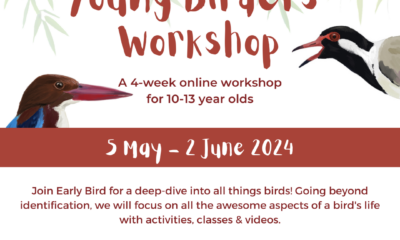

Young Birders’ Workshop Opens Registration for Children Aged 10-13 Years
-
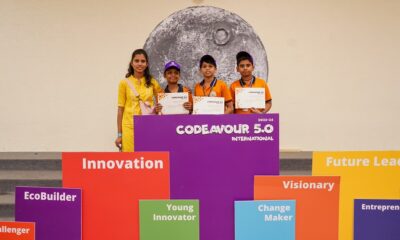

STEMpedia Successfully Completed Codeavour 5.0- India’s National Innovation Fest
-


Reviving School Education: Countering the Coaching Centre Dominance
-


CBSE to Initiate Pilot for National Credit System in Grades 6, 9, and 11
-


The Role of Marketing in Education: Navigating the New Educational Landscape
-


From Overwhelmed to Empowered: Strengthening Educator Skills for Success
-
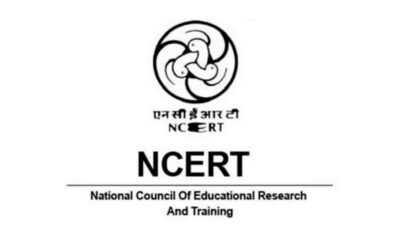

NCERT Introduces Bridge Month Programme for Class 6 Amid Textbook Transition
-
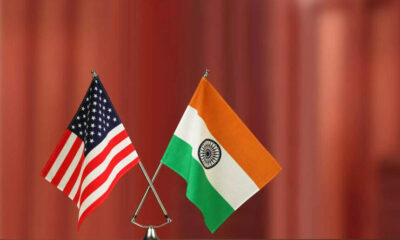

Indian Embassy Advocates for India-US Collaboration in Education Sector
-


Nurturing Healthy Behaviors: The Role of Schools in Shaping Health-Conscious Citizens
Education
Questioning the Trend of Lavish Farewells- #FarewellFiasco
Published
9 hours agoon
April 18, 2024
Imagine your child is attending their Year 12 farewell. It is a night they have been looking forward to, marking the end of their school journey and the start of something new. The atmosphere is charged with excitement, laughter, and the bittersweet feeling of saying goodbye. As the evening wraps up, the buzz does not fade; it shifts to the streets. A group of friends, adrenaline still running high from the night’s celebrations, decide to extend the farewell with a car rally. Among them is Aarav, driving his family’s SUV, a vehicle too powerful for his inexperienced hands.
The city sleeps as the convoy of cars snakes its way through the deserted streets, the hum of engines breaking the night’s silence. Aarav, feeling the thrill of the chase, pushes the pedal down, the speedometer needle climbing higher and higher. His friends, in the car beside him, cheer him on, the competition heating up as they approach the ring road. It is a wide stretch, seemingly perfect for their race, away from the prying eyes of the night.
But in a heartbeat, the night turns tragic. Aarav loses control. The SUV, now a projectile, careers off the road, skidding and tumbling for what seems like an eternity. The aftermath is a scene of devastation. The vehicle, unrecognisable, lies in ruins, and silence once again claims the night, now heavy with the weight of consequences.
By the time the first light of dawn touches the sky, the police are at the scene, piecing together the events. The accident leaves one young soul lost to the night and another battling for life in hospital. Questions swirl around the circumstances that led to this moment. Was it the rush of speed, a momentary lapse in judgement, or something more? The community is left reeling, grappling with the reality of a celebration turned catastrophe.
As the investigation unfolds, the police sift through CCTV footage, trying to trace the sequence of events and the other vehicles involved. Speculations arise that the tragedy was the result of a high-speed race gone wrong. Amidst this, a family mourns the loss of their child, a farewell that was meant to be a celebration now a memory marred by loss and regret.
This story, though actual, has been anonymized to protect the identity and privacy of the student involved. It highlights a critical issue prevalent in communities worldwide: the trend of extravagant farewells escalating into dangerous activities, posing threats not only to the students but also to society as a whole.
As we reflect on this story, it compels us to ask: Is the pursuit of a grand goodbye worth the price of a life? How do we balance the celebration of milestones with the responsibility we owe to our children’s safety and to each other? This tale, inspired by true events, leaves us pondering the traditions we uphold and the lessons we impart to the young minds we are nurturing for the future.
To read more on such trends that need to be called out and #un-trended, head to the April issue of our magazine here.
Education
STEMpedia Successfully Completed Codeavour 5.0- India’s National Innovation Fest
Published
3 days agoon
April 15, 2024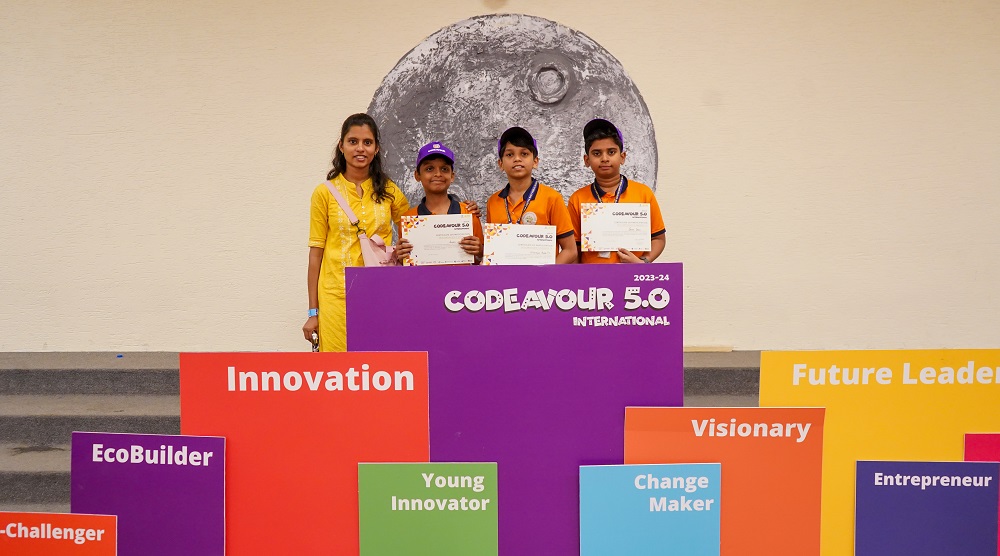
STEMpedia, in collaboration with ART PARK@IISc, India’s premier AI & Robotics Technology Park, established by the Indian Institute of Science in Bengaluru, successfully concluded the national level event of 2023’s biggest innovation fest, Codeavour 5.0 International. This year’s event, supported by leading organisations including AI Foundry, Startup India, and INDIAai, witnessed participation from 300,000 students across 70 countries, underscoring its global impact and the cumulative achievements of the competition to date.
The event, which also enjoyed backing from entities like AWS, NITI Aayog, and STEM.org, focused on fostering hands-on learning and innovation among next-gen participants. They were encouraged to create projects using PictoBlox that would contribute towards making the world a better place, aligning with the United Nations Sustainable Development Goals.
Dhrupal Shah, Director and CEO of STEMpedia, reflected on the journey and the fest’s objectives, saying, “Five years ago, we initiated Codeavour with the intention to empower young innovators and equip them with the necessary skills for the future workforce. This year, we are thrilled to announce that the top 20 winners will be awarded a trip to Mexico to participate in the FAB24 Event, accompanied by their mentors.”
The fest not only highlighted the technical skills of young minds but also provided them with a platform to showcase their creative solutions to real-world problems. In addition to the innovation and entrepreneurship track, participants competed in the AI-Robo City Challenge, demonstrating their prowess in applying AI and robotics to urban development challenges.
The panel discussion titled “AI EduFusion Conclave: Shaping Global School Education with AI, Robotics, and Policy Insights” was a highlight of the event, featuring experts like Dr. Sreejit Chakrabarthy from GEMS Dubai American Academy and Mr. Pankaj Verma from STEMpedia. The discussion provided insights into how governments and educational institutions are integrating AI and robotics into school curriculums to prepare students for future job markets.
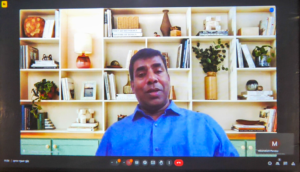
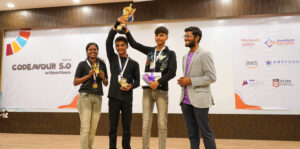
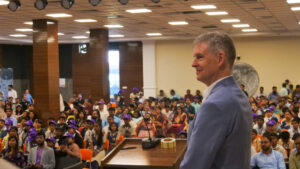
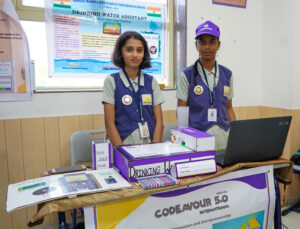
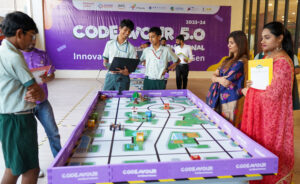
The event culminated with the National Innovation Awards, where participants presented projects that tackled environmental challenges and proposed sustainable solutions. Winners from the event will now proceed to the International Showdown in Dubai, hosted in partnership with Dubai American Academy.
As Codeavour 5.0 International wraps up, its success marks a significant step forward in integrating technology and education, inspiring the next generation of innovators and leaders to think critically and act creatively. The continued expansion of this fest promises to keep pushing the boundaries of what young students can achieve in the fields of AI and robotics.
Education
Reviving School Education: Countering the Coaching Centre Dominance
Published
1 week agoon
April 11, 2024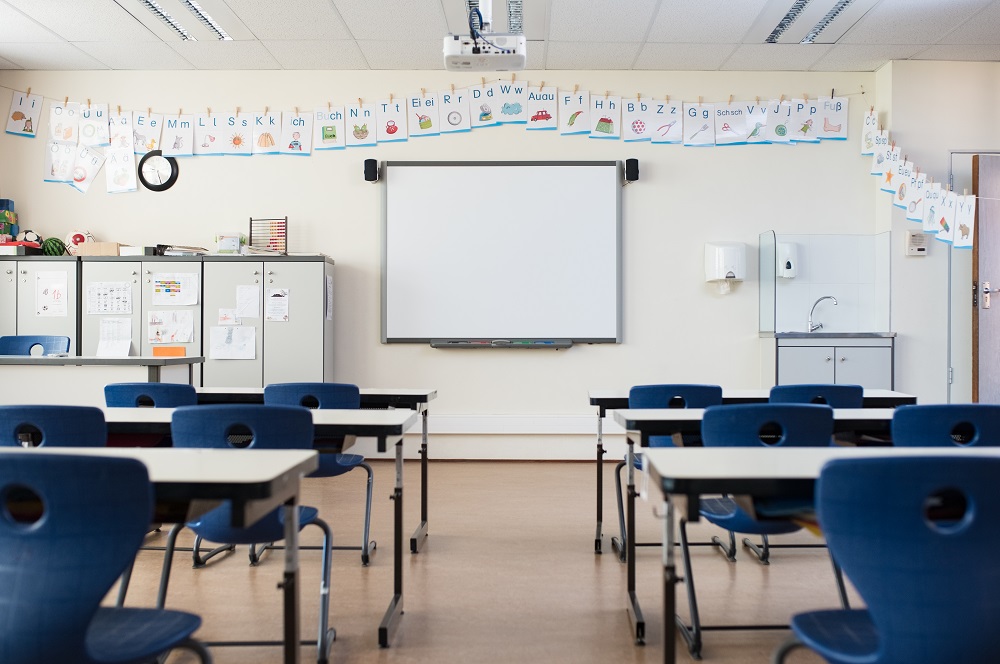
In recent years, a troubling trend has emerged within the educational landscape: the rise of “Dummy Admissions,” where students formally enrolled in schools are effectively abandoning the classroom in favour of coaching institutes. This phenomenon, particularly prevalent from the 11th standard onwards, sees students dropping out of school to prepare for competitive exams under the tutelage of coaching centres, which were originally intended to supplement, not supplant, school education.
The shift has been stark. Coaching, once a support system, has transformed into a parallel education industry, with some arguing it overshadows the broader developmental benefits of traditional schooling. This evolution poses a critical question: How can schools reclaim their role not just as preparatory grounds for board exams but as sanctuaries of holistic education that truly prepare students for life?
The Diminishing Role of Schools
The primary role of any educational institution is to foster an environment conducive to learning, curiosity, and personal growth. Schools are meant to be arenas where young minds receive a balanced education — academically, socially, and emotionally. However, the allure of scoring top marks in competitive exams has tilted the focus sharply towards rote learning and intensive exam preparation, often at the expense of holistic development.
The Coaching Conundrum
Coaching centres operate with a laser focus on results, primarily targeting competitive exams like the JEE, NEET, and others. This narrow approach prioritises immediate academic results over long-term learning and personal development. Students, driven by the pressure to excel in these high-stakes environments, often find themselves estranged from the broader educational experiences that school offers — experiences that are crucial in shaping well-rounded individuals capable of adapting to life’s varied challenges.
Reclaiming the Sanctuary of Education
For schools to regain their central place in the educational journey of students, they must evolve to meet the diverse needs of their students. Here are a few strategies that could help schools reassert their relevance:
- Integrated Curriculum: Schools could integrate aspects of competitive exam preparation into their regular curriculum, thus reducing the need for external coaching. This would allow students to prepare for exams without missing out on the broader educational offerings of the school.
- Focus on Skill Development: Beyond academic prowess, schools should enhance their focus on developing critical life skills such as critical thinking, problem-solving, creativity, and communication. These skills are crucial for success in professional and personal life and can make schooling more relevant.
- Counselling and Support Services: Enhanced counselling services can help students navigate their educational pathways and career choices effectively. Schools should equip students with the tools to make informed decisions about their futures.
- Experiential Learning: Schools must emphasise experiential and contextual learning, making education a more engaging, practical, and enjoyable experience. This can be achieved through project-based learning, internships, and real-world problem-solving scenarios.
- Parental Engagement: Engaging parents in the educational process and informing them about the importance of a balanced education can help shift the focus from mere exam preparation to overall development.
- Promotion of Arts and Sports: Encouraging participation in arts, sports, and other co-curricular activities can enrich students’ educational experience and support the development of a wide range of skills.
As the educational landscape continues to evolve, the challenge for schools is not just to prepare students for exams but to prepare them for life. In a world increasingly dominated by coaching centres, schools must innovate and broaden their educational offerings to ensure they remain valued not just as conduits to board results but as launchpads for the futures of students. It’s about striking a balance between academic rigor and holistic development, ensuring that schools remain the nurturing grounds for the leaders of tomorrow.
To read more on such trends that need to be called out and #un-trended, head to the April issue of our magazine here.
Education
CBSE to Initiate Pilot for National Credit System in Grades 6, 9, and 11
Published
1 week agoon
April 11, 2024
The Central Board of Secondary Education (CBSE) is set to launch the pilot for National Credit Framework for students in classes 6, 9, and 11, commencing in the 2024-25 academic session. This innovative step, aimed at fostering a seamless integration of school, higher, and vocational education, aligns with the National Education Policy (NEP) 2020’s vision for a holistic and flexible educational system.
Under the new scheme, students will have the opportunity to earn credits through a variety of learning avenues, including classroom teaching, laboratory work, projects, sports, performing arts, NCC, social work, vocational education, and experiential learning. These credits will be accumulated in the Academic Bank of Credit (ABC), linked to the student’s APAAR ID and DigiLocker, ensuring a cohesive and secure record of their academic journey.
The introduction of the National Credit Framework marks a significant shift towards competency and outcome-based education, aiming to bridge the gap in achieving learning outcomes. It encourages students to engage in additional courses, programs, or projects beyond the mandatory 40 credits, offering them the flexibility to tailor their educational experiences to their interests and career aspirations.
To facilitate the smooth implementation of this framework, the CBSE has developed draft guidelines, which have been refined through multiple workshops and received approval from the Union Ministry of Education. “To further test, refine, and assess their effectiveness in real-world contexts, a pilot implementation of these guidelines has been planned in schools affiliated with CBSE,” stated a letter from the CBSE to school principals.
Schools interested in participating in this groundbreaking pilot program have been invited to register their interest, marking a collaborative effort to enhance the educational offerings for students across the nation.
This initiative not only promises to transform the way students learn and earn qualifications but also paves the way for a more inclusive and flexible education system that caters to the diverse needs and aspirations of India’s youth. As the CBSE embarks on this ambitious journey, it sets the stage for a future where education is not just about accumulation of knowledge but the holistic development of every student.
(Source- PTI)
Education
The Role of Marketing in Education: Navigating the New Educational Landscape
Published
1 week agoon
April 10, 2024
In an increasingly competitive and interconnected world, the concept of marketing, once synonymous with businesses and industries, has found its place within the realm of education. As educational institutions vie for attention amidst a cacophony of voices, the need for strategic marketing and public relations (PR) efforts has become paramount. While the moral implications of marketing in education may spark debate, there is a compelling argument for incorporating marketing concepts into the educational curriculum, equipping students, teachers, and parents with the knowledge and skills to make informed decisions in an ever-evolving educational landscape.
Gone are the days when educational institutions relied solely on their academic prowess to attract students. In today’s digital age, where information is abundant and attention spans are fleeting, the ability to cut through the noise and communicate effectively has become a prerequisite for success. From crafting compelling brand narratives to leveraging social media platforms, educational institutions are embracing marketing strategies to enhance their visibility and appeal to prospective students and stakeholders.
However, the incorporation of marketing into the educational sector extends beyond mere promotional efforts. At its core, marketing is about understanding the needs and preferences of your target audience and delivering value accordingly. By teaching marketing concepts to students, educators empower them with critical thinking skills and an understanding of consumer behaviour, enabling them to navigate the complex marketplace of ideas and opportunities.
Moreover, marketing education goes beyond the classroom, extending its reach to teachers and parents alike. Educators, tasked with shaping the minds of future generations, can benefit from an understanding of marketing principles to engage students more effectively and create meaningful learning experiences. Similarly, parents, as key stakeholders in their children’s education, can make more informed decisions about school choice and educational resources by understanding the marketing strategies employed by educational institutions.
Critics may argue that the commodification of education undermines its intrinsic value and fosters a culture of competition at the expense of collaboration. While these concerns are valid, it is essential to recognize that marketing, when approached ethically and responsibly, can serve as a powerful tool for positive change. By promoting transparency, accountability, and accessibility, marketing can help bridge the gap between educational institutions and the communities they serve, fostering a culture of trust and mutual respect.
The integration of marketing concepts into the educational curriculum represents a paradigm shift in how we approach education in the digital age. By equipping students, teachers, and parents with the knowledge and skills to navigate the complexities of the modern educational landscape, we empower them to make informed decisions and drive meaningful change. As we embrace the potential of marketing in education, let us remain mindful of its ethical implications and strive to harness its power for the greater good.
Education
From Overwhelmed to Empowered: Strengthening Educator Skills for Success
Published
1 week agoon
April 10, 2024
In the corridors of any classroom, teachers stand as pillars of guidance, tasked not only with imparting knowledge but also with nurturing the holistic development of their students. However, the onerous burden of managing a multitude of responsibilities within resource-constrained environments poses a formidable challenge, underscoring the urgent need for enhanced teacher training programmes.
At the heart of this challenge lies the staggering class sizes prevalent in Indian schools. With classrooms often overflowing with 35 or more students, the task of catering to diverse learning needs while maintaining order can seem insurmountable. Effective classroom management techniques, tailored to accommodate large cohorts, are essential for fostering a conducive learning environment and mitigating stress for both teachers and students.
Moreover, the complexity of the modern educational landscape necessitates a multifaceted approach to teaching. From addressing academic gaps to promoting socio-emotional well-being, educators are expected to wear multiple hats, often without adequate training or support. Enhanced teacher training programmes must equip educators with the pedagogical tools and strategies necessary to navigate this intricate web of responsibilities effectively.
Central to the need for better teacher training is the imperative of managing workload and stress. The relentless demands of completing the curriculum, crafting assessments, and addressing administrative tasks can take a toll on educators’ mental health and overall well-being. By providing teachers with comprehensive training in stress management techniques, time management strategies, and self-care practices, we can empower them to strike a balance between professional duties and personal wellness.
Addressing the point of the topics that should be touched upon, these teacher training programmes must encompass modules on effective assessment practices and differentiated instruction. By equipping educators with the skills to design assessments that cater to diverse learning styles and abilities, we can ensure that every student receives the support they need to thrive academically. Similarly, training in differentiated instruction enables teachers to tailor their teaching methods to meet the individual needs of each student, fostering a more inclusive and equitable learning environment.
In addition to addressing immediate challenges, enhanced teacher training programmes must also focus on future-oriented skills and competencies. With rapid advancements in technology and pedagogy, educators must be prepared to adapt to changing educational landscapes and embrace innovative teaching methodologies. By providing training in digital literacy, collaborative learning, and project-based instruction, we can empower teachers to harness the potential of emerging technologies and create engaging learning experiences for their students.
Ultimately, the need for better teacher training is not merely a matter of professional development; it is a moral imperative. By investing in the growth and well-being of educators, we invest in the future of our nation. Because one teacher’s well-being will lead to the well being of those 35 other kids in a classroom.
Education
NCERT Introduces Bridge Month Programme for Class 6 Amid Textbook Transition
Published
1 week agoon
April 10, 2024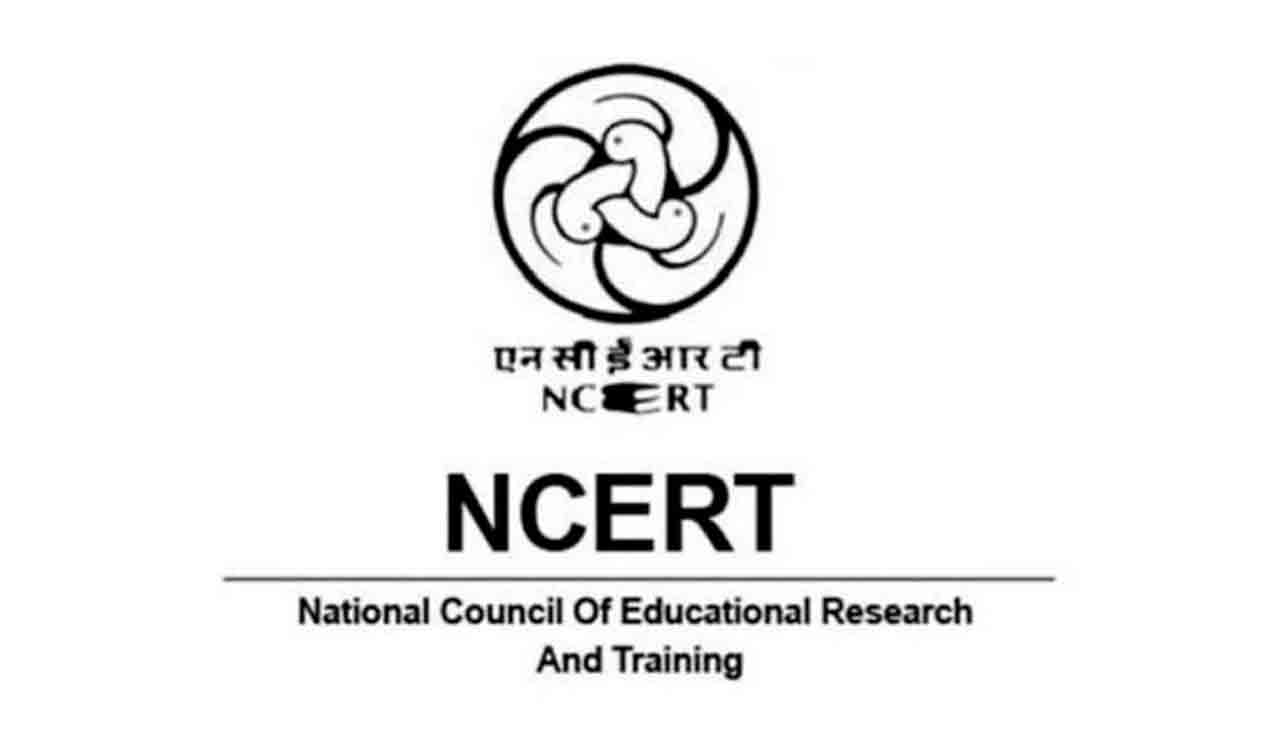
In a bid to revolutionize the educational landscape and foster a more dynamic learning environment, the National Council of Educational Research and Training (NCERT) has unveiled its Bridge Month Programme tailored for Class 6 students. This initiative marks a significant departure from conventional teaching methodologies, placing a heightened emphasis on interactive sessions and projects aimed at enhancing students’ overall skill set.
Aligned with the National Curriculum Framework for School Education (NCF-SE) and the recently implemented National Education Policy (NEP), NCERT’s Bridge Month Programme is poised to redefine the educational experience for both students and educators alike. By steering away from rote memorization towards a competency-based approach, the programme seeks to cultivate a deeper understanding of various subjects while nurturing critical thinking and problem-solving abilities.
The month-long bridge course is meticulously crafted to equip teachers with innovative pedagogical tools designed to engage students in enjoyable and enriching learning experiences. Through a curated blend of fun-based, play-based, and discovery-based activities, educators are empowered to guide students towards holistic development, transcending the boundaries of traditional classroom instruction.
Central to the programme’s ethos is the integration of vocational skills within the curriculum, commencing as early as Class 6. This forward-looking approach not only broadens students’ horizons but also fosters practical, real-world application of academic concepts. Additionally, the restructuring of the Grade 6 timetable allows for a dedicated immersion period, during which students can delve into a myriad of engaging activities spanning subjects like science, social studies, and vocational education.
With the impending release of new textbooks for Classes 3 and 6, NCERT’s phased approach ensures a seamless transition to the updated curriculum across all educational levels. As educators and students embark on this transformative journey, the overarching goal remains clear: to cultivate a generation of lifelong learners equipped with the skills and knowledge to thrive in an ever-evolving world.
As reported by India Today.
Education
Indian Embassy Advocates for India-US Collaboration in Education Sector
Published
1 week agoon
April 8, 2024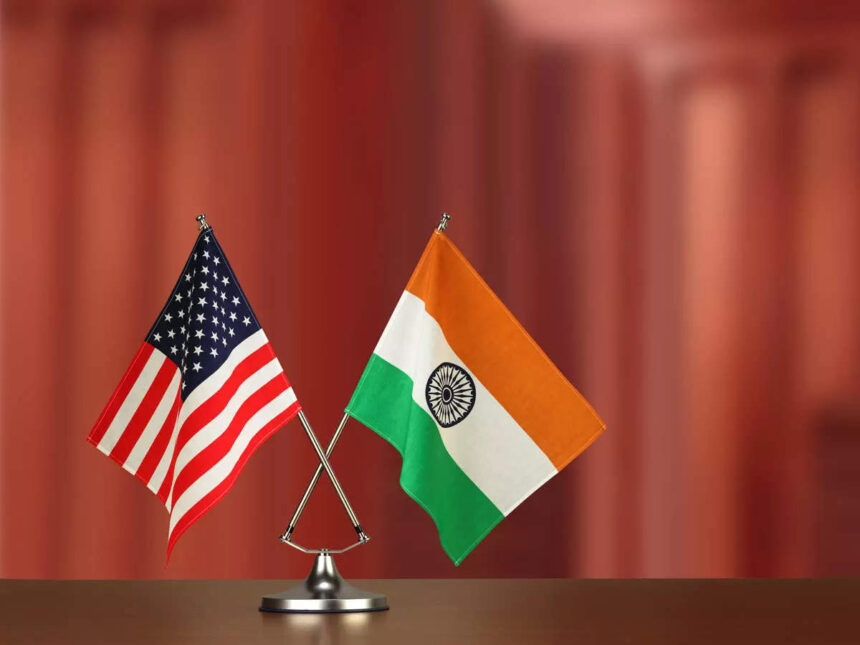
The Indian Embassy in Washington DC has underscored the significance of fostering collaboration between India and the United States in the realm of education. In a recent social media post on platform X, the embassy expressed contentment with the fruitful engagement it had with senior faculty members from esteemed universities in Washington DC.
During the interaction, the embassy stressed the substantial opportunities for bolstering knowledge and research partnerships between India and the US. This joint endeavour aims to bolster educational initiatives and advocate for the well-being of Indian students pursuing studies in the United States.
“Excellent interaction with senior faculty from prominent universities in Washington DC on India-US collaboration and opportunities for strengthening knowledge and research partnership and promote well-being of Indian students in the US,” stated the Indian Embassy in a post on X.
Moreover, amidst recent distressing incidents involving Indian nationals or individuals of Indian origin in the US, US Ambassador to India, Eric Garcetti, has addressed concerns regarding the safety of Indian students studying in the United States. Garcetti urged students to remain vigilant and employ appropriate safety precautions, while emphasizing the importance of staying connected with peers and utilizing campus safety resources to enhance awareness and preparedness.
In a recent interview with ANI, Garcetti acknowledged the distressing incidents involving Indian students, noting that such occurrences can statistically happen in a country of this scale. He reiterated the importance for students to remain vigilant and take necessary safety measures.
As per reports, five Indian students were reported dead in separate incidents in the first two months of 2024. (Source: ANI)
Education
Nurturing Healthy Behaviors: The Role of Schools in Shaping Health-Conscious Citizens
Published
2 weeks agoon
April 7, 2024
In the landscape of education, schools play a pivotal role far beyond the realms of academic learning; they are instrumental in moulding the future of our society by nurturing health-conscious citizens. This World Health Day, as we embrace the theme ‘My health, my right’, it’s crucial to spotlight the impact of school programs and policies in fostering healthy lifestyle choices among students. This endeavour not only aligns with students’ rights to education about health but also paves the way for a healthier, more informed generation.
In India, where diverse cultural backgrounds and socioeconomic statuses often dictate one’s access to health education and resources, schools have a unique opportunity to bridge these gaps. The Midday Meal Scheme, one of the largest school nutrition programs globally, serves as a sterling example. By providing nutritious meals to children in government and government-aided schools, it aims not just to combat hunger but to promote nutritional education and healthy eating habits among young learners. This initiative directly impacts the health and educational outcomes of approximately 115 million children across the country, showcasing the powerful role schools can play in shaping health-conscious behaviours.
Furthermore, the Government of India’s Rashtriya Kishor Swasthya Karyakram (RKSK) program emphasizes the importance of adolescent health, targeting the 253 million adolescents in the country. RKSK aims to integrate health education into schools, covering critical areas such as nutrition, mental health, and substance misuse, thereby ensuring that young individuals are equipped with the knowledge and skills to make informed health decisions.
However, the journey doesn’t end with national programs. Individual schools across India are taking innovative steps to encourage healthy behaviours. For instance, several institutions have introduced yoga and meditation into their daily routines, recognizing the importance of mental well-being alongside physical health. These practices not only improve students’ concentration and stress management skills but also instill a lifelong appreciation for holistic health practices.
Moreover, environmental health has become a growing concern, with schools incorporating lessons on sustainability and the importance of preserving our planet for future generations. Initiatives like setting up organic gardens, recycling projects, and awareness campaigns on water conservation are becoming increasingly common, fostering an eco-conscious mindset among students.
Despite these strides, challenges remain. Access to quality health education and resources is not uniform across India’s vast and varied landscape, with rural and underprivileged communities often at a disadvantage. Addressing these disparities requires concerted efforts from policymakers, educators, and communities to ensure that every child, irrespective of their background, has the right to health education and the opportunity to grow into a health-conscious citizen.
As we observe World Health Day, it’s clear that schools are much more than places of academic pursuit. They are crucial battlegrounds in the fight for a healthier future, where informed, conscious choices are not just encouraged but ingrained. By continuing to develop and implement comprehensive health education programs, schools can truly honor the theme ‘My health, my right’, turning it from a vision into a reality for every student across India.
Education
CBSE Updates Exam Structure for 11th & 12th Class; Concept-based Questions Now 50% of Weightage
Published
2 weeks agoon
April 5, 2024
In a significant overhaul of the examination structure, the Central Board of Secondary Education (CBSE) has announced changes to the year-end assessment format for Classes 11 and 12, commencing from the academic session 2024-25. The board has decided to enhance the weightage for competency-based questions to 50%, a substantial increase from the previous session’s 40%. This adjustment aims to shift the focus towards application of concepts in real-life scenarios, aligning with the new National Education Policy (NEP) 2020.
The recent circular dispatched to all CBSE-affiliated schools outlines the board’s decision to reduce the weightage for traditional short and long-answer questions to 30%, down from 40% in the 2023-24 academic session. This move is part of the board’s ongoing efforts to foster an educational environment that prioritises critical thinking, creativity, and application of knowledge over rote memorisation.
“Continuing with its practice of aligning assessment and evaluation with the new National Education Policy (NEP) 2020 in the forthcoming 2024-25 academic session, the percentage of competency-based questions that assess application of concepts in real-life situations is increased by 10 per cent,” reads the circular issued on April 3.
Competency-based questions will encompass multiple-choice questions, case-based, and source-based integrated questions. According to a senior official from the CBSE, the increment in weightage for competency-based questions has been a consistent annual strategy for the past three years, reaching its peak at 50% this year.
The CBSE has chosen not to modify the examination format for Classes 9 and 10, maintaining the structure set during the previous academic year. The changes for senior secondary classes reflect the board’s commitment to the NEP’s vision of competency-based learning as opposed to the traditional textbook-driven approach.
“The main emphasis of the board was to create an educational ecosystem that would move away from rote memorisation and towards learning that is focused on developing the creative, critical and systems thinking capacities of students to meet the challenges of the 21st century,” the CBSE conveyed in its letter to school heads.
This reform is a stride towards equipping students with the necessary skills and knowledge to navigate the complexities of the modern world, ensuring they are not only exam-ready but also prepared for the challenges and opportunities that lie ahead in the 21st century.
Newsletter

Questioning the Trend of Lavish Farewells- #FarewellFiasco

Young Birders’ Workshop Opens Registration for Children Aged 10-13 Years

STEMpedia Successfully Completed Codeavour 5.0- India’s National Innovation Fest

Reviving School Education: Countering the Coaching Centre Dominance
CBSE to Initiate Pilot for National Credit System in Grades 6, 9, and 11

The Role of Marketing in Education: Navigating the New Educational Landscape

From Overwhelmed to Empowered: Strengthening Educator Skills for Success

NCERT Introduces Bridge Month Programme for Class 6 Amid Textbook Transition

Indian Embassy Advocates for India-US Collaboration in Education Sector

Nurturing Healthy Behaviors: The Role of Schools in Shaping Health-Conscious Citizens

CBSE Updates Exam Structure for 11th & 12th Class; Concept-based Questions Now 50% of Weightage

Sharing the spotlight: When parent and child take board exams together

Rebalancing the Scales: The Urgent Call for Humanities in STEM-Dominated Curricula

Palette of Possibilities: Nurturing Creativity in Schools through Modern Art

Empowering Minds: The Journey of My Guide Inside with Christa Campsall

The Potential of an Entrepreneurial Development Programme for Primary School Students

FPSB India and IIM Bangalore Forge Strategic Partnership to Advance Financial Education

1 in 6 School-Age Children Face Cyberbullying: Calls for Immediate Action

GD Goenka Group To Establish 12 New Schools from April 2024

World Theatre Day: Let Theatre Arts Make Classroom’s Showtime Spectacular!

Lessons Beyond a Cricket Pitch: An IPL-Inspired School Curriculum

Post-pandemic: Embracing Well-being in India’s Schools with My Guide Inside

The Intersection of Happiness and Technology in Education

India-Bhutan Strengthen Ties: Focus on STEM Education

Life of My Father: Dr. Jagdish Gandhi, a Pioneer in Education

Life of My Father: Dr. Jagdish Gandhi, a Pioneer in Education

Mayo College Announces New Leadership

Post-pandemic: Embracing Well-being in India’s Schools with My Guide Inside

Empowering the Future: The Success of Beti Bachao Beti Padhao in Girls’ Education

Is Students’ Data in Safe Hands in a Digital World?

Central Government Sets New Framework for Coaching Centres

FPSB India and IIM Bangalore Forge Strategic Partnership to Advance Financial Education

Radio Broadcasting in Schools: Creating a Platform for Student Voices

India to recognise Farsi as a classical language under New Education Policy

Farewell to a Pioneer: Dr. Jagdish Gandhi’s Enduring Legacy in Education

Kerala Introduces ‘Water-Bell’ Initiative in Schools to Boost Hydration

Anticipating a Progressive Leap: The Education Sector’s Hopes for Union Budget 2024

Lexicon Schools Spark Innovation with STEAM Fest

The Need to Preserve Newspapers for Bias-Free Education

A Voice for All Ages: The Enduring Legacy of Ameen Sayani in Indian Education

Target Publications hosts workshop for grade 10th and 12th students of Snehasadan Shelter Homes and Reap NGO

Seth M. R. Jaipuria School launches CBSE School in Bhiwadi, Rajasthan

From 2025-26, Indian Students to Get Two Opportunities to Sit for Board Exams

The Rising Leaders’ Summit 2024: A Timeless Learning for Future Educational Leaders

International Women’s Day 2024: Are We Not Special?

ISRO Launches Young Scientist Programme 2024 for Budding Space Enthusiasts

Can Hindi Become the Next Global Language?

Teach for India Invites Applications for its 2024 Fellowship Program

Ministry of Women and Child Development Unveils National Curriculum Framework for Early Childhood Care and Education

World Theatre Day: Let Theatre Arts Make Classroom’s Showtime Spectacular!
SGEF2023 | Special Address by Rama Datt, Trustee, Maharaja Sawai Man Singh II Trust, Jaipur

ScooNews | After Movie | ScooNews Global Educators Fest 2023

Aftermovie | NIES2 UP Chapter | 21 Jan 2023

WEBINAR | Gamification in Education: How Digital Badges Can Boost Student Motivation and Engagement

ScooNews | WEBINAR| Importance of Physical Activity for Children at School | Plaeto

SCOONEWS | WEBINAR | WHY DIGITIZING YOUR SCHOOL IS A MUST | TEACHMINT

Keynote Address | Lakshyaraj Singh Mewar

Anurag Tripathi, Secretary, CBSE at SGEF2022

How schools can nurture every student’s genius

Aftermovie | SGEF2022 | Jaipur

Li Andersson | Minister of Education | Finland

Anurag Tripathi, Secretary, Central Board of Secondary Education (CBSE) discusses NEP2020

ScooNews | Early Ed Asia 2019 | Aftermovie
#PodarECEconf : Pursuing quality ECE

#CBSE Class XII #Results #Highlights

The interesting story of India’s educational system | Adhitya Iyer

A young scientist’s quest for clean water

The Danger of Silence: Clint Smith

National Digital Library of India is an initiative by HRD Ministry

Remembering Kalpana Chawla on her birthday!

Message from Sadhguru for Students!
Message from Sadhguru for Students!

The Untapped Genius That Could Change Science for the Better

Eddy Zhong: How school makes kids less intelligent TEDxYouth@Beacon

#TEDxCanberra : What if every child had access to music education…
Trending
-
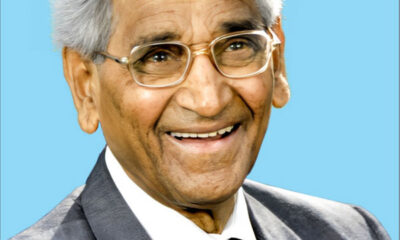
 Inspiration1 month ago
Inspiration1 month agoLife of My Father: Dr. Jagdish Gandhi, a Pioneer in Education
-
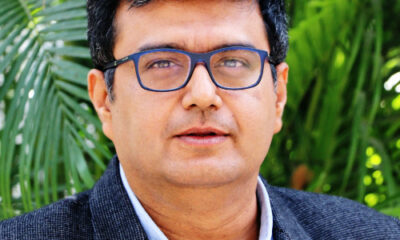
 Education3 months ago
Education3 months agoMayo College Announces New Leadership
-

 Education4 weeks ago
Education4 weeks agoPost-pandemic: Embracing Well-being in India’s Schools with My Guide Inside
-
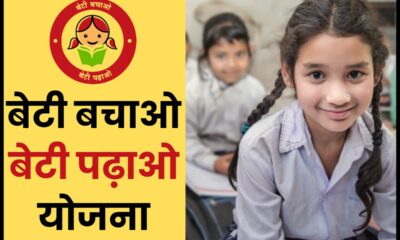
 Education3 months ago
Education3 months agoEmpowering the Future: The Success of Beti Bachao Beti Padhao in Girls’ Education
-

 Knowledge3 months ago
Knowledge3 months agoIs Students’ Data in Safe Hands in a Digital World?
-
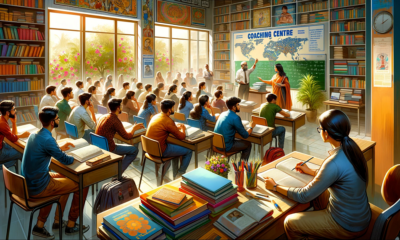
 Education3 months ago
Education3 months agoCentral Government Sets New Framework for Coaching Centres
-
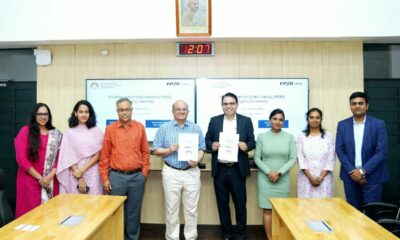
 Education3 weeks ago
Education3 weeks agoFPSB India and IIM Bangalore Forge Strategic Partnership to Advance Financial Education
-
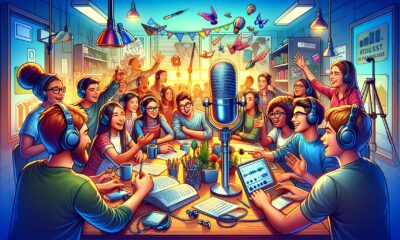
 Education2 months ago
Education2 months agoRadio Broadcasting in Schools: Creating a Platform for Student Voices
-
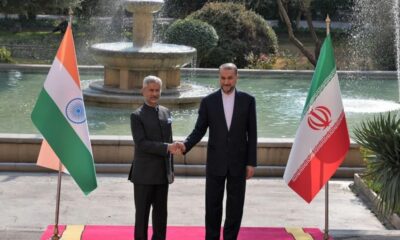
 Education3 months ago
Education3 months agoIndia to recognise Farsi as a classical language under New Education Policy
-
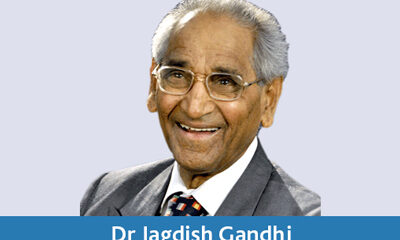
 Education3 months ago
Education3 months agoFarewell to a Pioneer: Dr. Jagdish Gandhi’s Enduring Legacy in Education



